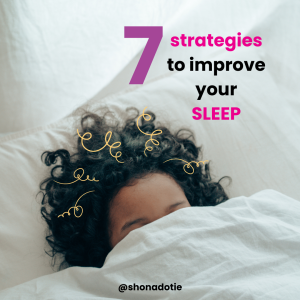
We’ve all heard by now the importance of getting 8-10 hours sleep per day, but how is that actually possible?
Your lives are busy and “getting an early night” isn’t always easy, but here’s some tried and tested strategies to help increase your overall amount of sleep:
1.Establish a consistent routine
Going to bed and waking up at the same time every day (even on weekends!) helps regulate the body’s internal clock. This makes it easier to fall asleep and wake up feeling refreshed. It doesn’t matter necessarily what time you go to bed and wake up at, but if you can stick to the same time every day you’re more likely to see the benefits.
2.Create a relaxing unwinding routine
This could include reading a book, practicing deep breathing, gentle yoga, or taking a warm bath. Let your brain and body know that it’s time to wind down and prepare for sleep. If you’re all go, go, go right up until the moment you crash into bed, how is your brain supposed to know it’s sleep time now?
3.Limit screen time before bed
Blue light emitted by screens can disrupt the production of melatonin, which is what regulates your sleep-wake cycles. Even just try 1 hour of screen-free time. You can leave the doom scrolling for another day! Even if you have to start with 20 minutes screen-free and work your way up from there, it’s still better than nothing.
4.Create a sleep sanctuary
A cool, dark, and quiet space will contribute to better sleep. But also think comfy pillows, soft pjs and maybe your childhood teddy bear to really make it your personal sanctuary. Make your space your own, an environment that you look forward to coming to after a long day.
5.Healthy lifestyle habits
Regular exercise during the day can promote better sleep at night, but it’s essential to avoid vigorous physical activity close to bedtime. You should also limit things like caffeine and sugar intake late in the evening/night. Foods like cheese, chocolate or anything spicy can also potentially cause more vivid dreams and nightmares, so it’s worth avoiding them when you can as well.
6.Manage stress and anxiety
Easier said than done right? Taking care of your mental health is important for all aspects of your life. If you’re feeling particularly stressed or anxious before bed, you can try journaling, practicing mindfulness or meditation, or talking to a friend or family member. Getting your thoughts out on paper, or to another person, can help take the weight off your shoulders – even if it’s only for long enough for you to fall asleep.
7.Seek professional help if necessary
If your lack of sleep is starting to effect your well-being no matter what you try, it might be time to ask for help. A visit to your doctor might be the next step you need, and they can give you the professional advice on what to do next.
BONUS TIP
Everyone’s mind and body is different, so what works for one person might not work for another. You also don’t have to try all 7 of these at once. Prioritise your peace, see what works best for you, one step at a time.


